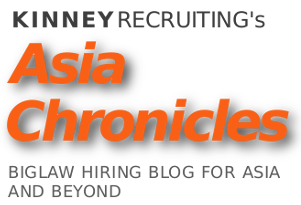Your choice of a 2L summer position and permanent first year position can drastically affect your marketability in Asia.  We often speak to law students and lawyers with glowing resumes who likely will never land out in Asia biglaw because they chose a career path incompatible with landing in Asia biglaw. You are in a unique position during your 2L year and 2L summer to shape your legal career. Choosing the right law firm and practice area will tremendously increase your chances of landing in Asia.
We often speak to law students and lawyers with glowing resumes who likely will never land out in Asia biglaw because they chose a career path incompatible with landing in Asia biglaw. You are in a unique position during your 2L year and 2L summer to shape your legal career. Choosing the right law firm and practice area will tremendously increase your chances of landing in Asia.
We have been getting several emails from law students or recent graduates inquiring as to how to land a position in Asia. Unfortunately, law firms do not use recruiters to hire law students or newly-graduated US associates, although this is not the case if you are a newly-qualified UK, HK or other Commonwealth-qualified associate. If you are newly-qualified in the UK, HK or other Commonwealth jurisdiction, you’re in luck – law firms do occasionally ask our assistance in helping them find junior candidates, and that includes NQ’s.
For US-qualified associates, the path to landing a job in Asia starts during your 2L year. If you have an
eye toward working in Asia, here is what you should be focusing on starting in your 2L year.
2L Year: Choose your summer associate firm wisely. Law firms in Asia are being highly selective
and while positions at smaller or mid-sized law firms may offer you “real legal experience”, your path
to Asia will be paved by biglaw, particularly New York biglaw.
The law firms in Asia that have US practice groups are predominantly the top New York, California
and Magic Circle law firms, with a few top Boston and Chicago firms as well. The US practice groups
of all of these law firms are all staffed with lawyers with some New York-style biglaw experience,
regardless of where the firm’s home office is. The candidate who spent 14 hours a day proofreading
offering circulars during her first year at a V5 Wall Street firm in New York will be seen as a much
stronger candidate than the candidate who was negotiating merger agreements for a top regional law
firm or boutique mid-sized firm during his first year, even if the two candidates came from the same
law school and had identical GPAs.
Lawyers with New York training are also preferred because the transaction style in Asia (particularly
for M&A/PE) is much more similar to the transaction style in New York. Candidates who are from, or
did a capital markets rotation in London or another foreign office will also be highly prized, because
the work involving foreign issuers in major overseas markets like London is very similar to that in
Asia.
Some law firms will even go so far as to require NY bar membership, but the vast majority of law
firms will be fine with being from a non-NY or CA firm with a top national reputation. Prior to
the recession, firms were much more lax about hiring associates from all over the U.S., but the vast
majority of successful candidates post-2009 are from offices of top firms in NYC, with California
coming in second.
Do you need to pick a firm with an Asia office? In the doldrums of 2009, the majority of candidates
we placed came from Vault 5 law firms, some of which do not have an Asia office (most notably the
ones whose names start with “C” and “W”). For lateral hiring in Asia, reputation of the firm matters
much more than whether or not your firm has an Asia office.
Should you spend your summer in an Asia office, or mention your desire to do so in interviews? If you
get the opportunity, heck yes! Many law firms have summer associate programs in their Asia offices,
including top Wall Street and Magic Circle firms, and you may even get the opportunity to start your
career in Asia if a permanent offer is extended to you. Ask your CSO for more details. However, it is
not a problem if you cannot summer at the Asia office of your chosen law firm.
Is relying on OCI adequate? Of course not! If you are invited to, or qualify for a job fair, attend it.
Mail your resume to all firms in the Vault 50 which do not interview at your school or offer interviews
with law students from your school via job fair.
To summarize – Pick the most highly ranked law firm that gives you an offer.
2L Summer: Once you start your summer, put yourself in a position to get as much capital markets
and M&A experience as you can. These are the two most sought-after skill sets in Asia. Having plain-
vanilla capital markets experience (not derivatives experience), especially with foreign issuers and/or
with 144A or Regulation S transactions (ask your securities regulation professor about what these are),
will open a lot of doors for you in Asia.
M&A experience is the second most popular skill set. Some firms in Asia have focused on developing
a robust M&A/private equity practice and did not bet on the capital markets horse, so to speak. We
also see requests for associates with acquisition finance and fund formation experience, but these are
less common. Robert Kinney does an excellent job of describing the various open positions in Asia on
both this website and on Above the Law. This should give you a strong idea of what firms in Asia are
looking for.
US-qualified arbitrators/litigators are not yet popular hires in Asia. While a handful of law firms have
US-qualified litigators in Asia and we expect this number to grow over the next 5 years, this market
is still too immature to be breached by entry-level associates at this time. As the market matures,
litigators with FCPA experience will probably become the most valuable.
Some firms in Shanghai have IP groups, but they have not traditionally hired US-qualified lateral IP
associates. This could be a casualty of the recession. We believe that IP litigation/patent prosecution
is another field to watch in Asia, but as with litigation/arbitration, it is still an undeveloped market that
will take several years to grow.
Bankruptcy, tax and real estate associates can be tricky sells, too. There is virtually no demand for a
US bankruptcy, tax or real estate attorney outside of the US. Before the recession, law firms would
hire bankruptcy associates from top NY practices and “retool” them into capital markets or M&A
associates. Unfortunately, many of these associates were the first to be laid off when the recession hit,
and while an economic extinction-level event is unlikely to occur again, law firms are currently very
reluctant to hire any associate needing retooling.
To summarize – Make sure the firm has a strong M&A/private equity/capital markets practice and
that you put yourself in a position to get this kind of work. Do not bet on the markets for arbitrators
or IP associates maturing in time to hire you.
What if I get no-offered?
Unfortunately, the vast majority (perhaps over 95%) of no-offered candidates or those who cannot find
a job through OCI will not be marketable by a recruiter in biglaw anywhere. Please keep in mind that
the traditional channels – including OCI, job fairs, mass mailings and using recruiters once you are a
practicing attorney – are not the only way to get a job in Asia, and that there are many non-traditional
jobs in Asia available to attorneys who are willing to do extra detective work.
These jobs do not often use recruiters and lawyers who successfully find such positions do so through
mining their network of personal and professional contacts. In 2009, I spoke to a mid-level attorney
who got laid off from a top NY law firm who had also spent time in one of its Asia offices. He said
that he managed to get a job teaching law at one of the local universities.
Sometimes firms seeking junior associates will be interested in seeing the resume of a 3L who has been
no-offered, but this is rare. If you are no-offered, maximize 3L OCI as much as possible and also send
your resume AS SOON AS YOUR SUMMER ASSOCIATE PROGRAM ENDS to as many firms in
the Vault 100 as you can which do not interview on-campus.
Do not wait until September 1 to start your mass mailings as OCI will have begun by that time.
Another route for no offered 3Ls is to apply to PRC, Korean or Japanese local firms, but that is only an
option for those with native or near-native language skills.
3L Year: There’s not much you can do at this point. If you don’t already have a permanent offer lined
up, 3L OCI is your best bet and keep the same criteria in mind that I outlined above. If you have a
permanent offer lined up but want to shop around, keep in mind the same criteria that I outlined above
for 2Ls.
LLMs: Whether or not an LLM will be successful in Asia depends on (1) whether they are qualified
in another jurisdiction and have a few years of actual attorney experience before entering their LL.M.
program and (2) the robustness of the NYC lateral market. If firms are desperate for associates, they
dip heavily into the LLM pool because those persons are usually highly academically qualified.
Related Posts:
- None Found
